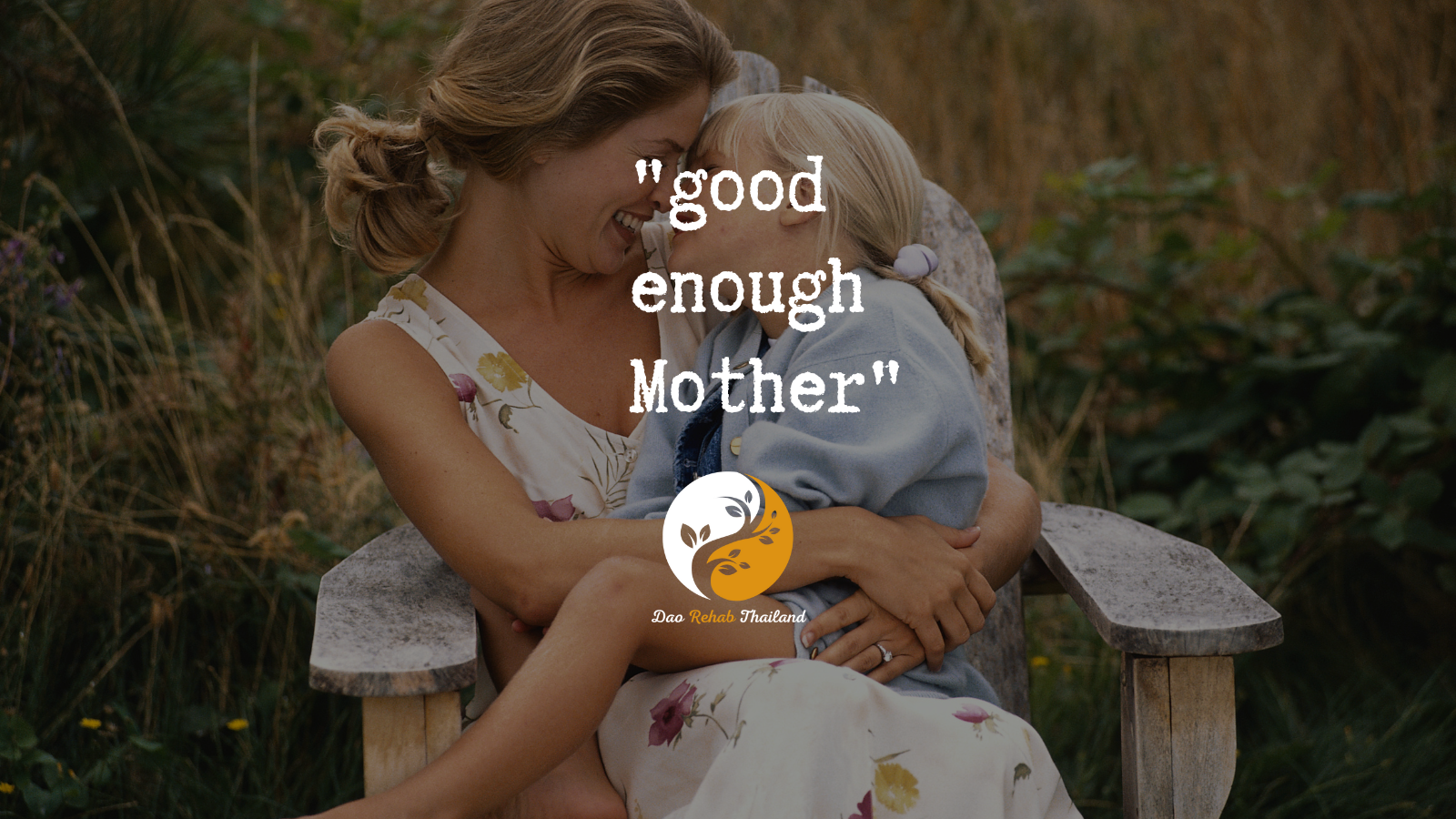
good enough mother
good enough
mother
Everything is possible

"Detox from Drugs at a Luxury Holistic Center in Thailand and Israel"

The concept of the "good enough mother"
The concept of the “good enough mother” was introduced by the British pediatrician and psychoanalyst Donald Winnicott. It describes a mother (or primary caregiver) who provides adequate, but not perfect caregiving, allowing the child to develop a sense of independence and resilience.
"Holistic Center for Trauma, Addiction, and Mental Imbalance Treatment in Thailand"
“Come to the beginning of your journey to freedom from addiction to alcohol, drugs, and pills, and rediscover your life within the serene embrace of DaoTherapy Rehab in Thailand—where holistic healing meets empowering recovery.”
DaoTherapy Holistic Rehab
Key Elements of Drugs Detox:
Medical Supervision: Drugs detox must be conducted under medical supervision, as the body may experience withdrawal symptoms. These can include nausea, anxiety, muscle aches, and insomnia. A medical team will monitor and manage these symptoms to ensure the patient’s safety and comfort.
Holistic Therapies:
Holistic Therapies: Many detox programs incorporate holistic therapies such as mindfulness, yoga, and meditation to help individuals cope with stress and anxiety during the detox process. These therapies support the mind-body connection and contribute to overall recovery.
Tapering Process
Tapering Process: Drugs detox often involves a gradual tapering of the drug to reduce withdrawal severity. Doctors will slowly decrease the dosage over time to allow the body to adjust to lower levels of the substance.
Psychological Support:
Psychological Support: Like any addiction recovery process, detox from Drugs includes psychological support. This can involve counseling, therapy, or support groups to address the mental and emotional aspects of addiction.
Post-Detox Treatment:
Post-Detox Treatment: After completing detox, continuing treatment is crucial to prevent relapse. This often includes participation in ongoing therapy, group support, and the development of new coping strategies to maintain sobriety.
The fear is inherent in the mind itself, which itself is hollow and devoid of content
Key Aspects of the “Good Enough Mother” Concept:
- Gradual Adaptation – At first, the mother meets the infant’s needs almost completely, fostering a sense of security.
- Allowing Frustration – Over time, she allows the child to experience small frustrations, helping them learn to self-soothe and tolerate distress.
- Encouraging Independence – By not being overly intrusive or protective, she supports the child’s natural development of autonomy.
- Emotional Availability – She is emotionally present and attuned, but not perfectly so, teaching the child to navigate emotional ups and downs.
Why “Good Enough” and Not “Perfect”?
- A perfect caregiver prevents a child from developing frustration tolerance and self-reliance.
- A neglectful caregiver causes insecurity and emotional distress.
- A “good enough” mother finds a balance, providing love and care while allowing the child to experience and process small challenges.
Implications for Development
Winnicott believed that the good enough mother helps the child develop:
- A true self (a sense of authenticity)
- Emotional resilience
- Healthy attachment and interpersonal skills
- The ability to handle life’s uncertainties and frustrations
This idea is widely used in psychotherapy, parenting, and attachment theory, emphasizing that children do not need perfect parents—just ones who provide a secure base while allowing for growth.
Would you like this explanation translated into Russian and English, or do you need an illustration of the concept.

contact us
Contact us with your questions
We would love to speak with you! Feel free to reach out with any questions.

get in touch
Schedule a free consultation
Schedule a free consultation with our team and let’s make things happen!
Gradual Adaptation
Definition:
Gradual adaptation refers to the slow and natural process by which a caregiver (such as a mother) adjusts their level of responsiveness to a child’s needs over time. This concept is central to Donald Winnicott’s theory of the “good enough mother”, allowing the child to develop independence while still feeling safe and supported.
Key Aspects of Gradual Adaptation:
-
Initial Total Responsiveness:
- In the early stages of infancy, the mother (or caregiver) is almost entirely attuned to the baby’s needs, responding immediately to hunger, discomfort, and emotional distress.
- This creates a deep sense of security and trust in the infant.
-
Introducing Small Delays and Challenges:
- As the child grows, the mother gradually introduces minor frustrations, such as waiting a little longer before responding to cries.
- These small delays help the child learn to tolerate discomfort and develop basic self-regulation skills.
-
Encouraging Self-Sufficiency:
- Over time, the mother encourages the child to engage in self-soothing behaviors, such as finding comfort in a toy, thumb-sucking, or developing problem-solving abilities.
- This prevents over-dependence on external reassurance and fosters emotional resilience.
-
Balancing Support and Challenge:
- The caregiver still remains emotionally available, but does not overprotect or over-intervene in every difficulty the child faces.
- This process allows the child to build a sense of autonomy while knowing they have a secure base to return to.
Psychological Impact of Gradual Adaptation:
✅ Promotes a Strong Sense of Self – The child learns that they can survive minor frustrations and challenges.
✅ Builds Emotional Resilience – The ability to cope with life’s difficulties without excessive anxiety.
✅ Encourages Healthy Attachment – The child trusts that the caregiver is reliable but also allows space for growth.
✅ Prepares for the Real World – In life, needs are not always met instantly; learning this in a safe environment helps later in adulthood.
Contrast: What Happens Without Gradual Adaptation?
❌ Over-responsiveness (Helicopter Parenting): Leads to dependence, anxiety, and difficulty handling frustration.
❌ Under-responsiveness (Neglect): Causes insecurity, lack of trust, and emotional instability.
Allowing Frustration
Definition
Allowing frustration is a crucial part of healthy psychological development, where a caregiver gradually introduces small, manageable disappointments to help a child develop emotional resilience and self-regulation. This idea is a key aspect of Donald Winnicott’s “good enough mother” theory, which emphasizes the importance of balancing care and independence.
Key Aspects of Allowing Frustration
-
From Total Dependence to Gradual Separation
- In infancy, a caregiver immediately meets the child’s needs, ensuring a sense of safety and attachment.
- Over time, the caregiver introduces small delays in gratification, teaching the child that discomfort can be tolerated and overcome.
-
Building Tolerance for Discomfort
- Instead of instantly soothing every distress, the caregiver allows the child to experience mild frustration (e.g., waiting briefly for food, not always being picked up immediately).
- This helps develop self-soothing mechanisms and prevents over-dependence on external comfort.
-
Fostering Problem-Solving and Emotional Resilience
- When a child experiences manageable frustration, they begin to explore ways to cope (e.g., playing, self-soothing, seeking comfort in a toy).
- This process is essential for building autonomy and a sense of personal agency.
-
Preparing for Real-Life Challenges
- Life naturally brings disappointment and setbacks. If a child is overprotected from frustration, they may struggle with anxiety, emotional instability, or entitlement.
- Learning frustration tolerance early helps in developing patience, emotional regulation, and resilience.
Psychological Benefits of Allowing Frustration
✅ Develops Frustration Tolerance – The ability to endure discomfort without reacting impulsively.
✅ Strengthens Emotional Regulation – Learning how to manage disappointment without excessive distress.
✅ Encourages Self-Sufficiency – The child learns that they can solve problems independently.
✅ Builds Resilience – Facing small struggles prepares the child to handle life’s inevitable challenges.
✅ Enhances Social Skills – Children who tolerate frustration better adjust to friendships, school, and work environments.
What Happens Without Allowing Frustration?
❌ Overprotection: Leads to emotional fragility, dependence, and low resilience to stress.
❌ Excessive Frustration (Neglect): Can cause deep insecurity, anxiety, and emotional shutdown.
Application in DaoTherapy and Addiction Recovery
In DaoTherapy, allowing frustration is essential in the healing process. Many trauma survivors and addicts struggle with impulse control and distress tolerance, often seeking instant relief through substances or compulsive behaviors.
- Therapeutic Approach: Helping individuals sit with discomfort without escaping into addiction.
- Reframing Frustration: Teaching that discomfort is not dangerous but an opportunity for growth.
- Developing New Coping Mechanisms: Mindfulness, breathwork, and emotional regulation techniques replace destructive avoidance patterns.
Encouraging Independence
Definition
Encouraging independence is the gradual process of allowing a child to develop autonomy by giving them opportunities to make decisions, solve problems, and take responsibility for their actions while maintaining a supportive and nurturing presence.
Key Aspects of Encouraging Independence
-
Providing Opportunities for Autonomy
- Allowing the child to make small choices (e.g., picking their clothes, deciding between two snacks).
- Encouraging self-care activities (e.g., dressing, eating, brushing teeth).
-
Supporting Problem-Solving and Decision-Making
- Letting the child struggle a little before offering help.
- Teaching the child to think critically and find solutions.
-
Building Self-Confidence Through Responsibility
- Assigning age-appropriate tasks (e.g., setting the table, feeding a pet).
- Acknowledging efforts rather than just results (e.g., “You worked hard on that!”).
-
Balancing Guidance and Freedom
- Providing gentle supervision but allowing mistakes to happen.
- Encouraging self-reliance while offering emotional support.
Psychological Benefits of Encouraging Independence
✅ Develops Self-Confidence – The child feels capable and empowered.
✅ Builds Resilience – Facing small challenges strengthens emotional endurance.
✅ Encourages Responsibility – Learning to take ownership of actions and choices.
✅ Prepares for Adulthood – Establishes problem-solving skills for the real world.
What Happens Without Encouraging Independence?
❌ Overprotection: Leads to dependency, low self-esteem, and fear of failure.
❌ Neglect of Guidance: Can result in insecurity, lack of confidence, and risky decision-making.
Application in DaoTherapy and Addiction Recovery
In DaoTherapy, independence is a key aspect of healing. Many trauma survivors and addicts have struggled with control, dependency, or avoidance of responsibility.
- Therapeutic Approach: Encouraging individuals to make choices in their recovery journey.
- Self-Reliance Over External Validation: Helping clients trust their own decisions.
- Breaking Dependency Cycles: Moving away from reliance on substances, people, or escape mechanisms.
Psychological Support:
Psychological Support: Like any addiction recovery process, detox from Subutex includes psychological support. This can involve counseling, therapy, or support groups to address the mental and emotional aspects of addiction.
Emotional Availability
Definition
Emotional availability refers to a caregiver’s ability to be present, attuned, and responsive to a child’s emotional needs. It means creating a safe space where a child feels seen, heard, and understood without fear of judgment or rejection.
Key Aspects of Emotional Availability
-
Being Present and Attentive
- Actively listening without distractions (e.g., putting away the phone).
- Making eye contact and using comforting body language.
-
Validating Emotions Without Dismissing Them
- Acknowledging a child’s feelings instead of minimizing them (e.g., “I see you’re upset, and that’s okay”).
- Teaching that all emotions are acceptable, even difficult ones.
-
Providing a Safe Space for Expression
- Encouraging the child to express their thoughts and fears freely.
- Offering reassurance and comfort when they are distressed.
-
Responding with Sensitivity
- Avoiding harsh criticism or dismissive attitudes.
- Reflecting back emotions (“I hear that you’re feeling sad. Want to talk about it?”).
Psychological Benefits of Emotional Availability
✅ Builds Secure Attachment – The child feels safe, valued, and connected.
✅ Encourages Emotional Regulation – Learning how to express and manage emotions in a healthy way.
✅ Strengthens Self-Worth – Feeling understood fosters confidence and resilience.
✅ Promotes Healthy Relationships – Children model emotional availability in their own relationships.
What Happens Without Emotional Availability?
❌ Emotional Neglect: Leads to feelings of abandonment, insecurity, and low self-esteem.
❌ Dismissive Parenting: Can cause emotional suppression, anxiety, and relational difficulties.
❌ Overwhelming Responsiveness (Over-Attachment): Prevents emotional independence and self-regulation.
Application in DaoTherapy and Addiction Recovery
In DaoTherapy, emotional availability is crucial for healing trauma and addiction:
- Many individuals in recovery have never experienced true emotional availability from caregivers.
- Therapy focuses on rebuilding trust and learning to express emotions safely.
- Practicing emotional availability helps clients form healthier relationships and overcome emotional wounds.








